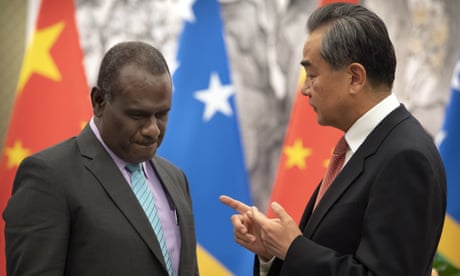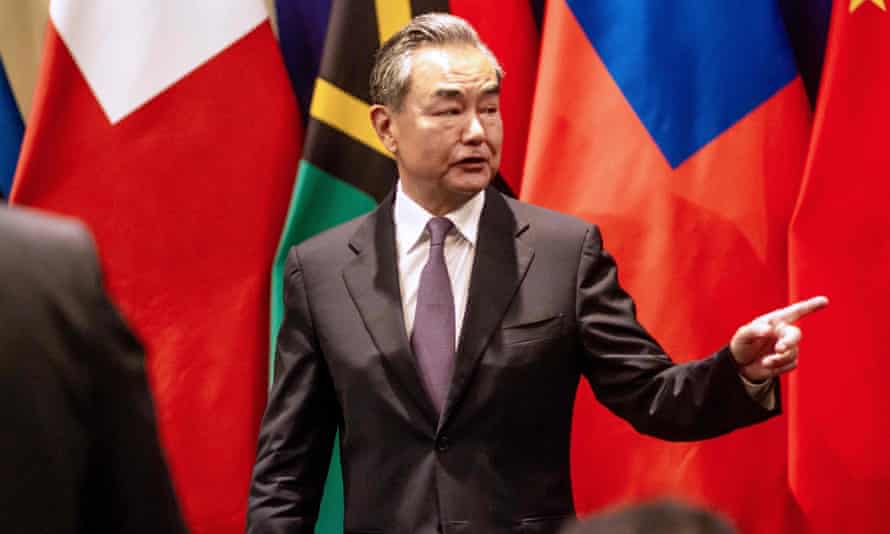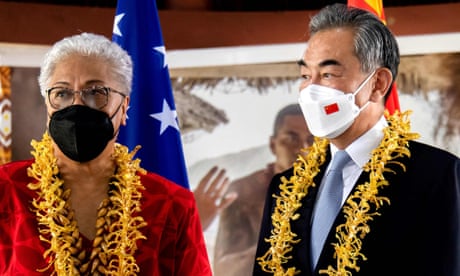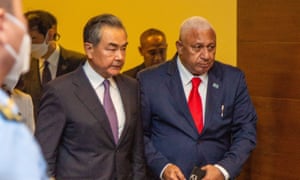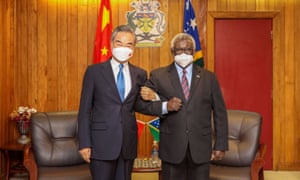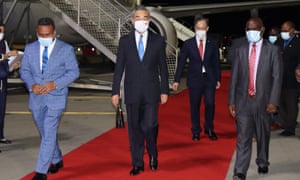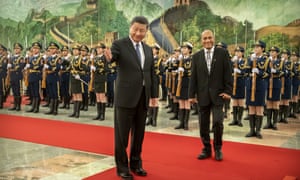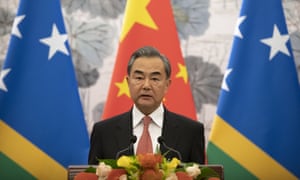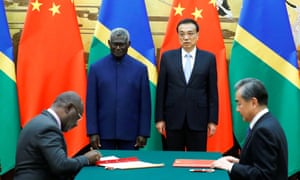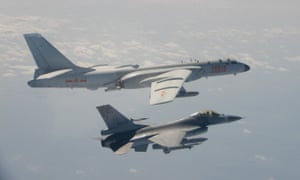Several Pacific nations reportedly want to defer action on the draft agreement or have it amended.
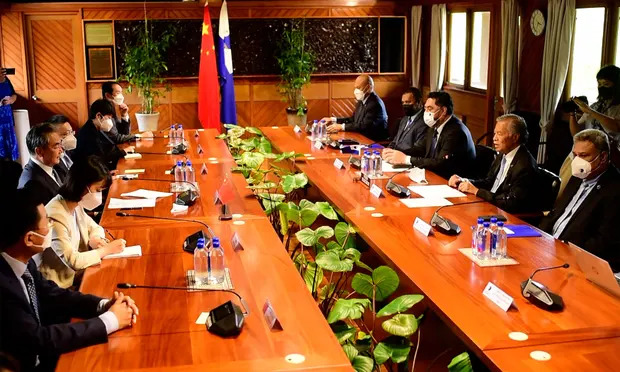 Henry Puna (2nd R), secretary general of the Pacific Islands Forum, holds a meeting with Chinese foreign minister Wang Yi (3rd L) in Fiji’s capital city of Suva as part of Wang’s marathon tour of the region. Photograph: Pacific Islands Forum/AFP/Getty Images
Henry Puna (2nd R), secretary general of the Pacific Islands Forum, holds a meeting with Chinese foreign minister Wang Yi (3rd L) in Fiji’s capital city of Suva as part of Wang’s marathon tour of the region. Photograph: Pacific Islands Forum/AFP/Getty Images
–
2022 May 30
–
Pacific countries have declined to sign up to a sweeping regional economic and security deal proposed by China, after a crucial meeting of Pacific foreign ministers and their Chinese counterpart on Monday.
China’s foreign minister Wang Yi is in the middle of a marathon tour of the region, visiting eight countries in 10 days, a trip that security experts have said represents a dramatic “uptick in tempo” of China’s push for influence in the region.
On Monday, Wang held a virtual summit in Fiji with foreign ministers from Pacific countries at which the region-wide deal was discussed. Several invited nations want to defer action on the draft communique or have it amended, an official from one Pacific country told Reuters.
Wang urged the Pacific region not to be “too anxious” about his country’s aims after the meeting was unable to agree on the pact.
The deal, which was leaked last week, covers everything from a free trade area with the region to providing humanitarian and Covid relief. It also lays out China’s vision for a much closer relationship with the Pacific, especially on security matters, with China proposing it would be involved in training police, cybersecurity, sensitive marine mapping and gaining greater access to natural resources.
After the meeting – which included Samoa, Tonga, Kiribati, Papua New Guinea, Vanuatu, Solomon Islands, Niue and Vanuatu – Wang said the nations had agreed on five areas of cooperation but further discussions were needed to shape more consensus.
The five areas he listed included economic recovery after the Covid pandemic, and new centres for agriculture and disaster, but did not include security.
“China will release its own position paper on our own positions and propositions and cooperation proposals with Pacific island countries, and going forward we will continue to have ongoing and in-depth discussions and consultations to shape more consensus on cooperation,” he told reporters in Fiji. Questions at the media briefing were not allowed.
Wang said some had questioned China’s motives in being so active in the Pacific islands, and his response was China supported developing countries in Africa, Asia and the Caribbean also.
“Don’t be too anxious and don’t be too nervous, because the common development and prosperity of China and all the other developing countries would only mean great harmony, greater justice and greater progress of the whole world,” he said.
At a press event after the meeting, attended by Wang and Fiji’s prime minister Frank Bainimarama, China confirmed the deal had been shelved for now.
China’s ambassador to Fiji said that while there had been “general support” for the agreement among foreign ministers, it had been put aside after some Pacific countries voiced concerns.
Bainimarama also alluded to dissent among some countries at the meeting, saying the group had a “consensus first” approach. After the meeting, Wang said that China would release a position paper to shape consensus and cooperation.
Australia’s foreign minister, Penny Wong, said on Monday evening “it’s up to the countries of the region to make choices for their people”.
“The security of the Pacific is the responsibility of the Pacific family, of which Australia is a part,” she said in a statement.
“And we want to help build a stronger Pacific family. Australia will always work with the Pacific family to address shared security challenges, which is why we will boost support for Pacific maritime security and increase defence cooperation. We want to bring new energy and more resources to the Pacific.”

The rejection of the deal comes after Wang touched down in Fiji on Friday as part of a diplomatic tour through the region. He met with Bainimarama on Monday, a summit that both leaders said had been successful.
The two countries signed at least three agreements after the meeting, which Wang said would expand cooperation over the economy, trade, agriculture, fisheries, tourism, civil aviation, education, law enforcement, and emergency management.
–
Wang said on Monday that China would provide assistance to Pacific Island countries with “no political strings attached”.
Bainimarama reaffirmed the importance of climate change to the Pacific, saying that Pacific nations were not interested in “geopolitical point-scoring” given the threats of climate change and the pandemic. He said he had urged China to make stronger commitments on the climate crisis, something he does when dealing with all major economies.
The leak of the proposed regional deal came just one month after the signing of a controversial bilateral security deal between Solomon Islands and China, which caused huge alarm across the west and prompted high-level diplomatic visits from Australia, New Zealand and the US, all of whom sought to urge the Solomon Islands government not to sign it.
Solomon Islands was Wang’s first stop on his eight-country tour last week before he went on to Kiribati and met with the president, Taneti Maamau.
A Kiribati official, who was not authorised to speak to media, said the pair had discussed fisheries, education and health, as well as trade and tourism opportunities, and that a security arrangement between the countries was not on the cards.
Samoa, which Wang visited on Saturday, signed a bilateral agreement with China promising “greater collaboration”. The details of the deal have not yet emerged.
The Samoan government confirmed in a press release on Saturday that Wang and the Samoan prime minister, Fiame Naomi Mata’afa, had met and discussed “climate change, the pandemic and peace and security”.
Local media were invited to witness the signing of a deal, but no questions were taken.
The Samoan release said China would continue to provide infrastructural development support to various Samoan sectors and there would be a new framework for future projects “to be determined and mutually agreed”.
After Fiji, Wang is scheduled to visit Tonga, Vanuatu, Papua New Guinea and Timor-Leste.
In a duel for influence, Australia’s new foreign minister Wong was in Fiji on Friday, reaffirming Australia’s commitment to the region and promoting the new government’s more ambitious targets on emissions reduction. Climate change, which is an acute existential threat to Pacific island nations, has been a point of tension in the relationship between the Pacific and Australia, which has been seen as a laggard on climate action.
The prime minister of Fiji praised Wong after the meeting, saying he had a “wonderful meeting” with her after she travelled to the country in her first solo overseas visit since being sworn in.
– additional reporting by Daniel Hurst
–
–
Topics
The Pacific Project
–
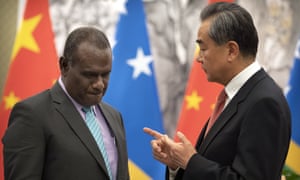
–
Most viewed
–
More from Headlines
–
© 2022 Guardian News & Media Limited or its affiliated companies. All rights reserved. (modern)
–
–
(For the source of this, and many other equally intriguing and important articles, please visit: https://www.theguardian.com/world/2022/may/30/chinas-foreign-minister-to-meet-with-pacific-nations-amid-push-for-sweeping-regional-deal/)










